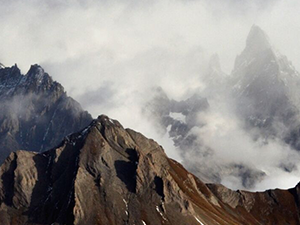TOURISM
PATHWAY 2
TOURISM
PATHWAY 2
Coaching and capacity building for climate proofing Alpine tourism

Basic information:
Tourism plays an important economic role for the Alpine economy. At the same time, tourism destinations will be highly affected by climate change and need to adapt their offers and services.
Decarbonizing Alpine tourism and ensuring that climate-resilience of tourism destinations and offers is improved requires considerable know-how and expertise of all relevant stakeholders which are involved in providing tourism services and infrastructures. Regarding climate mitigation, this requires detailed knowhow on types and impacts of potential mitigation measures; with respect to adaptation, tourism stakeholders need specific knowhow on potential climate impacts as well as different options for diversifying tourism offers to reduce their vulnerability to these impacts.
As many of these stakeholders are small- to medium-scale actors, they often do not have the relevant background to consider the full scope of necessary measures and to evaluate different measures and options within their range of action. There is a lack of specific education on energy efficiency, the role of regional value chains, etc. for example for stakeholders in the gastronomy and hotel sector. The same is true for operators of large tourism infrastructures, which need to understand the full extent of potential climate threats to climate proof their existing and potential new infrastructures as well as for destination managers which require information regarding diversification needs and potentials.
In line with pathway IP_Tou1 “Development of a coordinated vision for climate-neutral and climate-resilient Alpine tourism”, this pathway implements several forms of support, coaching and capacity building methods to ensure that the vision is fully implemented by all stakeholders involved in the tourism sector and that existing know-how and innovative approaches are fully explored.
Sequence of implementation steps:
- Enhance capacity of tourism stakeholders on climate mitigation and adaptation
- Link to know-how and expertise of other regional coordinators (if not integrated)
- Support implementation measures, including communication and awareness raising activities (link to climate-neutral tourism packages as proposed in pathway IP_Tou3 “Exploring the use of tourism packages for climate-neutral tourism”)
- Energy efficiency of buildings (gastronomy, hotels)
- Tourism mobility/transport
- Provision of regional products/establishing regional value chains
- Information and communication
The manual should be developed as open-access tool, which can be improved and updated continuously by the users (e.g., including a help function). If possible, the manual can be linked to the climate-neutral tourism packages as developed in pathway IP_Tou3.
Similar to the manual in step 2a, a decision making tool for evaluating different diversification strategies is developed. This decision making tool can be used by the “climate caretakers” together with stakeholders of tourism destinations to develop new tourism offers.
Considering the experiences made under steps 1 and 2, a coordinated framework for destination marketing, linked to climate-neutral vacations, will then be developed together with the network of “climate caretakers” and relevant stakeholders. This common destination marketing should also provide a link to the climate-neutral tourism packages as developed in pathway IP_Tou3.
Further Information:
- National and regional administrations involved in tourism development
- Representatives/stakeholders of tourism destinations
- NGOs involved in promoting sustainable tourism (CIPRA, Alpenvereine, ALPARC e.g.,)
- Regional coordinators as implemented in other fields of action (pathway IP_E1, IP_Tr2, IP_NH1)
- Installation of “Climate caretakers for Alpine tourism” in each tourism destination
- Open-access manual with sector-specific support tools for tourism stakeholders to enable mitigation and adaptation measures at company level
- Decision making tool for developing new and diversified tourism offers in a participatory approach
- Coordinated framework for destination and tourism services marketing which are linked to climate-neutral vacations
- Step 1: Number of climate caretakers installed in Alpine tourism destinations
- Step 2a: Set-up of a manual: yes/no + qualitative description, number of tools that are integrated in the manual, number of open access contributions, number of users
- Step 2b: Set-up of decision making tool: yes/no + qualitative description, number of users per year
- Step 3: Set-up of framework yes/no + qualitative description
- RSA4 “Sustainable Tourism in the Alps – Report on the State of the Alps” (2013)
- “Mobility solutions in the Alps” database (2015)
- Report of the WG Sustainable Tourism (2016)
- Activities implemented in the frame of the German Presidency: “Best practice guide on energy management in Alpine hotels” (stock-taking No. 41), “Workshop “Sustainable Economy in the Alps – Climate mitigation and Energy Efficiency in Hotel and Restaurant businesses” (stock-taking No. 42), “Online platform “Alpine Energy” for knowledge transfer on Energy Efficiency in the Hotel and Restaurant businesses” (stock-taking No. 43).
- Support tools implemented by mountaineering clubs, e.g., “Energieeffizienz im Hüttenwesen (Energy efficient mountain huts)” (stock-taking No. 62)
- Good practice examples and learnings of the participants of the ClimaHost contest that showed innovative solutions for climate protection and energy efficiency in the hotel industry and gastronomy in the Alpine region

